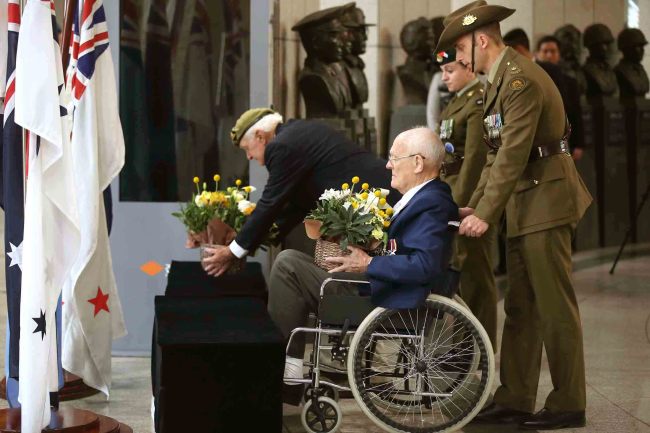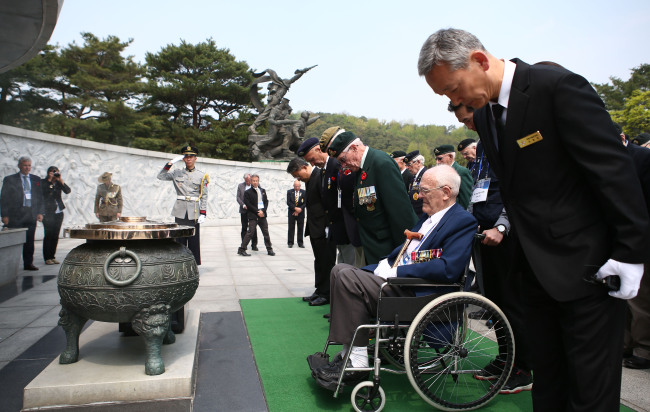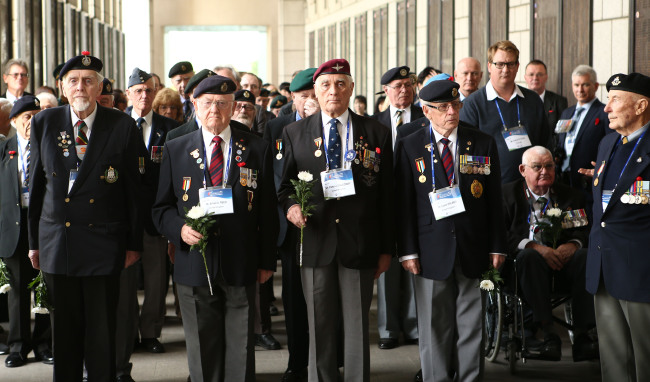Commonwealth veterans remember unsung heroes of wars
Uprearing the losses suffered by “mothers, fathers, brothers, sisters, grandparents and grandchildren,” the envoy said, “in place of their lives there are now quiet graves, memorials and fields.”
By Korea HeraldPublished : May 1, 2017 - 17:13
The embassies of the United Kingdom, Canada, Australia and New Zealand paid tribute to the sacrifices of their fallen comrades and war veterans across memorial services held in Korea last week.
At the ANZAC Day Dawn Service at the Korean War Memorial on Apr. 25, some 200 veterans, their families, servicepersons and diplomats honored the heroism of Australian and New Zealand Army Corps (ANZAC), which fought together in the Gallipoli Campaign in Turkey during World War I, as well as those who served in the Korean War.
Despite suffering heavy casualties on the Gallipoli peninsula from Turkish forces’ sustained defense, the ANZACs became allies with their former enemies the Turks in Korea, in their fight against communist North Korea. The Australian and New Zealand troops planned to commemorate ANZAC Day in April 1951 by inviting the Turkish troops, but the event didn’t materialize due to the Chinese invasion.
However, their spirit of brotherhood and allegiance, which extended to their former foes, came to define the integrity of the ANZACs, according to the Australian Embassy in Seoul. ANZAC Day now goes beyond the anniversary of the landing on Gallipoli and reflects universal desire for peace, the diplomatic mission said.
ANZAC Day is celebrated annually on April 25 around the world.
At the ANZAC Day Dawn Service at the Korean War Memorial on Apr. 25, some 200 veterans, their families, servicepersons and diplomats honored the heroism of Australian and New Zealand Army Corps (ANZAC), which fought together in the Gallipoli Campaign in Turkey during World War I, as well as those who served in the Korean War.
Despite suffering heavy casualties on the Gallipoli peninsula from Turkish forces’ sustained defense, the ANZACs became allies with their former enemies the Turks in Korea, in their fight against communist North Korea. The Australian and New Zealand troops planned to commemorate ANZAC Day in April 1951 by inviting the Turkish troops, but the event didn’t materialize due to the Chinese invasion.
However, their spirit of brotherhood and allegiance, which extended to their former foes, came to define the integrity of the ANZACs, according to the Australian Embassy in Seoul. ANZAC Day now goes beyond the anniversary of the landing on Gallipoli and reflects universal desire for peace, the diplomatic mission said.
ANZAC Day is celebrated annually on April 25 around the world.

“The 16,000 Australians and New Zealanders fought bitterly from trench to trench for eight months, and forged unshakable bonds,” Australian Ambassador to Korea James Choi said in a speech.
“Their sacrifice gave fresh meanings to the national pride of both our young nations. That bond endures to this day through the deep friendship Australians share with our neighbors across the Tasman Sea.”
Uprearing the losses suffered by “mothers, fathers, brothers, sisters, grandparents and grandchildren,” the envoy said, “in place of their lives there are now quiet graves, memorials and fields.”
“Their sacrifices are inscribed in our history and identity,” he added.
The ANZACs suffered more than 100,000 casualties -- 77,000 Australians and 24,000 New Zealanders.
At the commemorative event, the ambassadors of Australia, New Zealand, Turkey, the United Kingdom and Ireland were in attendance, alongside Korea’s Minister of Patriots and Veterans Affairs Park Sung-choon, Lt. Gen. Thomas W. Bergeson of the US 7th Air Force and War Memorial of Korea General Director Lee Young-gye.
“The world has changed a century later, but certain things have remained constant,” New Zealand Ambassador to Korea Clare Fearnley said in a speech, mentioning that ANZACs have been “actively engaged around the globe promoting and defending our security and national values like their forebears did.”
Citing natural disasters, terrorism, cyberattacks and conventional conflicts, the diplomat stressed the threats the two countries face have become “varied and fast evolving.”

Marking the 66th anniversary of the Battle of Gapyeong on Apr. 22-25, 1951, which was contested between UN forces -- primarily Australian and Canadian troops fighting in the British Commonwealth’s 27th Infantry Brigade -- and communist China’s People’s Volunteer Army, the Korean Ministry of Patriots and Veterans Affairs invited 80 veterans and their families from the UK, Canada, Australia and New Zealand last week. Earl Howe, UK deputy leader of the House of Lords and minister of state for defense, was also present.
More than 31,000 UN forces veterans and their families have visited Korea since the program began in 2010 under the ministry’s auspices.
On Wednesday, Canadian veterans and their families participated in a commemorative ceremony at the United Nations Memorial Cemetery in Busan, honoring the 26,000 compatriots who fought and died to protect South Korea’s democracy from communism.
From the summer of 1951 to the end of the war, the Canadian operations largely centered on areas north of Seoul as part of the British Commonwealth forces.
Canada suffered 516 dead during the war. Canada formed and sent the 2nd Battalion of Princess Patricia’s Canadian Light Infantry regiment, Special Force 2nd Battalions of the Royal Canadian Regiment and Royal 22nd Regiment, as well as the Royal Canadian Navy destroyers.

On Thursday, British veterans and their families took part in a memorial service in Paju, Gyeonggi Province, where the Gloucester Valley Battle Monument is located to venerate the actions of the Gloucestershire Regiment during the Battle of Imjin River in 1951.
Records say 4,502 British service personnel were killed or injured during the war, including over 1,000 dead.
According to British journalist and longtime Korea resident Andrew Salmon, who authored the book “Scorched Earth, Black Snow: The First Year of the Korean War,” published in English in 2011 and translated into Korean in 2015, the 27th Infantry Brigade was the first group of UN forces to land in Korea after the Americans, spearheading the allied advance north and retreat south as rearguards -- the most dangerous combat task (http://www.koreaherald.com/view.php?ud=20150628000307).
The book recounts the story of the 27th Infantry Brigade -- particularly the Middlesex Regiment, the Argyll and Sutherland Highlanders and the 3rd Battalion of the Royal Australian Regiment -- in the war’s early stages from August to the end of 1950.
By Joel Lee (joel@heraldcorp.com)
-
Articles by Korea Herald







![[KH Explains] How should Korea adjust its trade defenses against Chinese EVs?](http://res.heraldm.com/phpwas/restmb_idxmake.php?idx=644&simg=/content/image/2024/04/15/20240415050562_0.jpg&u=20240415144419)











![[Today’s K-pop] Stray Kids to return soon: report](http://res.heraldm.com/phpwas/restmb_idxmake.php?idx=642&simg=/content/image/2024/04/16/20240416050713_0.jpg&u=)